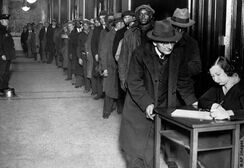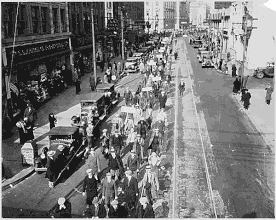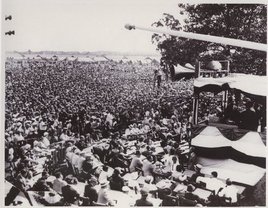History-- The Great Depression and the 1930s
* Native Americans * Exploration and Settlement * British colony
* Royal governance * Path to Revolution * Revolutionary War
* Industrialization * Civil War * Post-War Economy & Reform
* Woodrow Wilson as Governor * World War I & 1920s * Great Depression
* World War II * Post-War Development * 1960s & Richard Hughes
* 1970s & Income tax * 1990s-Whitman & Florio * 9/11 & McGreevey Administration
* Codey & Corzine * Chris Christie
* Phil Murphy
* Royal governance * Path to Revolution * Revolutionary War
* Industrialization * Civil War * Post-War Economy & Reform
* Woodrow Wilson as Governor * World War I & 1920s * Great Depression
* World War II * Post-War Development * 1960s & Richard Hughes
* 1970s & Income tax * 1990s-Whitman & Florio * 9/11 & McGreevey Administration
* Codey & Corzine * Chris Christie
* Phil Murphy
|
* Home
* History * Population * Government * Politics * Lobbyists * Taxes * State Symbols * Biographies * Economy * Employers * Real Estate * Education * Recreation * Restaurants * Hotels * Health * Environment * Stadiums/Teams * Theaters * Historic Villages * Historic homes * Battlefields/Military * Lighthouses * Art Museums * History Museums * Wildlife * Climate * Zoos/Aquariums * Beaches * National Parks * State Parks * Amusement Parks * Waterparks * Swimming holes * Arboretums More... * Gallery of images and videos * Fast Facts on key topics * Timeline of dates and events * Anthology of quotes, comments and jokes * Links to other resources |
-- The Great Depression The October 1929 stock market crash signaled the beginning of the Great Depression which would continue until the outbreak of World War II. At its depth, the jobless in New Jersey ranged between a quarter to a third of its workforce, with African American unemployed estimated at over half of workers. New Jersey per capita income fell from $839 in 1929 to $433 in 1933 and some 140 banks closed between 1928 and 1933.
-- Roosevelt and The New Deal
In 1932, New York Governor Franklin D. Roosevelt declared his candidacy for president, winning the nomination at the Democratic National Convention in Chicago. Jersey City Mayor Frank Hague had been a supporter of one of Roosevelt's principal opponents, Al Smith, the party's 1928 nominee and former New York governor who had backed Hague's election as vice chairman of the Democratic National Committee. After Roosevelt's nomination, however, Hague quickly shifted his loyalty from Smith to Roosevelt, hosting the nominee in a campaign kick-off tour on August 27 through New Jersey culminating in a rally at Sea Girt which drew an estimated 100,000 persons, most of whom were brought by train and bus from Hague's strongholds in North Jersey. Hague's demonstration to Roosevelt of his political strength later helped make him the conduit in the state for implementation of Roosevelt's New Deal policies, which included financing for many jobs projects under the Works Progress Administration. New Jersey WPA projects included construction of the Lincoln Tunnel, Jersey City Armory, additions to the Jersey City Medical Center, Roosevelt Park in Edison, Roosevelt Stadiums in Jersey City and Union City, Rutgers Stadium, and Hinchliffe Stadium in Paterson. Many schools and post offices also were built throughout the state. 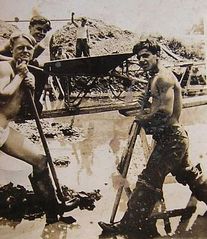 Civilian Conservation Corps workers shown at the Hackettstown State Fish Hatchery. Image: HackettstownLife.com/Oldman Civilian Conservation Corps workers shown at the Hackettstown State Fish Hatchery. Image: HackettstownLife.com/Oldman
In other areas of the state, Roosevelt's Civilian Conservation Corps established nine camps with 1,800 men between the ages of 17 and 25 employed in state forests and parks cutting trees, clearing trails and performing other tasks. Workers also were offered educational programs and vocational training; nationally, over 40,000 illiterate men were taught to read and write through the CCC.
Jersey Homesteads - The New Deal under FDR also initiated an experimental community--the establishment in 1937 of the borough of Jersey Homesteads, a few miles from Hightstown in Monmouth County. The town was founded, along with others in the nation, as a cooperative farming and garment manufacturing community comprised of two-hundred homes, along with a community building which soon became a school and a small retail store to sell garments made in the factory and serve as a grocery store for the residents. The project was developed by FDR's Resettlement Administration to resettle Jewish garment workers and their families from tenement housing in New York City and Philadelphia, giving them jobs on the farm or the garment factory and homes allocated through a lottery in return for a payment of $500. The design of the project, surrounded by a green belt of farms and open space and the single-story homes with flat roofs and white cement block walls, followed the Bauhaus style of land use and building features first introduced by German architects. The activities and governance of the community were conducted on a cooperative basis, which led to some critics suggesting the town was a socialist experiment following the Soviet Communist model. On November 9, 1945, the borough’s name of Jersey Homesteads was changed to Roosevelt in honor of FDR, who had died earlier in the year in April. The Jersey Homesteads cooperative model soon proved unable to compete with other factories and farms, and after the federal government withdrew its support, the the land and homes were sold for private ownership. While Jersey Homesteads did not succeed as a commercial venture, it would have a lasting legacy as a center for the arts. Early residents included the painter, sculptor and photographer Ben Shahn, known for his works of social realism pursuing his left-wing political views, who first joined the community in 1937 with his partner and later wife, Bernarda Bryson Shahn, a painter and lithographer. Other writers, musicians and poets of many establishing Roosevelt's continuing reputation today as an artists’ colony are the painter and wood engraver Jacob Landau; sculptor Leonid Siveriver; painter Gregorio Prestopino; wood engraver Stefan Martin; and photographers Edwin and Louise Rosskam. -- Refugees and the Nazis 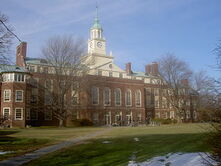 Institute for Advanced Study. Image: Wikimedia Commons Institute for Advanced Study. Image: Wikimedia Commons
The 1930's also saw the Roosevelt administration's attempts to restore economic health begin to compete with concerns over the deteriorating overseas situation. Refugees from the Nazis began to come to New Jersey, although federal quotas on immigrants to avoid competition for scarce jobs during the Depression prevented many from entering the country. In 1930, The Institute for Advanced Study was founded in Princeton, with financial support from Newark retailer Louis Bamberger and his sister Caroline Bamberger Fuld, as a center for theoretical research and to provide a haven for Jewish scientists fleeing the Nazis. Three years later, Albert Einstein emigrated to join the Institute's permanent faculty, and in 1939 Einstein wrote a letter to Roosevelt advising him of research which could lead to development of an atomic bomb. Like other areas of the country, New Jersey also included groups openly sympathetic to the anti-Semitic campaign of the Nazis. The German American Bund, an organization promoted by Hitler, maintained several chapters in the state and built Camp Nordland, a 200-acre retreat in Andover Township where it held rallies drawing crowds up to 10,000 and conducted youth training programs. The radio program of Father Edward Coughlin, a Catholic priest who attacked Jews and the Roosevelt policies, continued to be broadcast by a Newark radio station long after most other stations had cancelled Coughlin's program. Apart from the economy and the deteriorating situation in Europe, the 1930s also saw a series of diverse events which brought national attention to New Jersey.
-- Lindbergh kidnapping 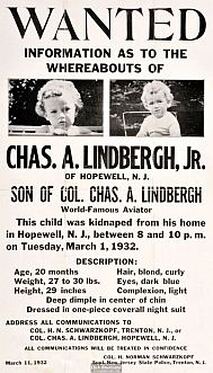
On March 1, 1932, Charles A. Lindbergh, Jr., the 20-month old son of Anne and the famed aviator Charles Lindbergh Sr., was kidnapped from the second-floor bedroom of the Lindbergh home in East Amwell. After an extensive search in which the senior Lindbergh and Herman Norman Schwarzkopf, the superintendent of the New Jersey State Police, took leading personal roles, the child's body was found in woods in Hopewell Township about 4.5 miles south of the Lindbergh home, with his death attributed to a skull fracture. In 1935, after his conviction in "the trial of the century" held at the Hunterdon County Court House in Hopewell, Bruno Richard Hauptmann, a German immigrant living in the Bronx, was executed for the child's death. -- Morro Castle
In 1934, the passenger liner Morro Castle, sailing to New York City from Havana, caught fire on September 8 off the New Jersey coast, resulting in 137 deaths of passengers and crew. The ship later came aground off the Convention Hall in Asbury Park, remaining there for six months and attracting thousands to view the ship before the hulk was towed away and scrapped. The cause of the fire was never `determined.
Next-- World War II
* Native Americans * Exploration and Settlement * British colony
* Royal governance * Path to Revolution * Revolutionary War * Industrialization * Civil War * Post-War Economy & Reform * Woodrow Wilson as Governor * World War I & 1920s * Great Depression * World War II * Post-War Development * 1960s & Richard Hughes * 1970s & Income tax * 1990s-Whitman & Florio * 9/11 & McGreevey Administration * Codey & Corzine * Chris Christie * Phil Murphy |
